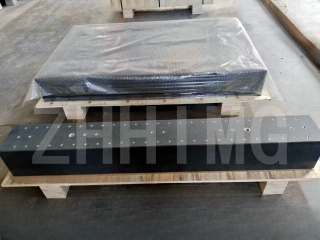Corrosion resistance of precision ceramic components and their importance in various industries
Precision ceramic components, as a key material in modern industry, have shown irreplaceable advantages in many fields with their excellent corrosion resistance. This corrosion resistance is mainly due to the unique chemical and structural stability of ceramic materials, which enables them to maintain stable performance in harsh environments for a long time.
Corrosion resistance of precision ceramic components
First, precision ceramic components have excellent chemical stability. This means that they can show good stability in a wide range of acid-base media and high temperature environments, and are not easy to be eroded or destroyed by chemicals. This stability makes precision ceramic components particularly important in industrial processes involving corrosive media, such as chemical, petroleum, pharmaceutical and other industries.
Secondly, the structural stability of precision ceramic components also provides a strong guarantee for its corrosion resistance. Ceramic materials have a tight lattice structure and a highly ordered arrangement, which can effectively resist the erosion of external factors and delay the aging and damage of materials.
In addition, the low permeability of precision ceramic components is also an important embodiment of its corrosion resistance. The density of ceramic materials makes it difficult to be eroded by permeable media, thus ensuring the stability and reliability of the material in the long-term use process.
Which industries are particularly important
Chemical industry: In the chemical industry, a variety of corrosive media such as strong acid, strong alkali and so on widely exist. Because of its excellent corrosion resistance, precision ceramic components have become indispensable key components in chemical equipment. For example, in the manufacturing of chemical reactors, storage tanks, pipelines and other equipment, precision ceramic components can effectively resist corrosion, extend the service life of the equipment, and improve production efficiency and safety.
Oil industry: Oil extraction and processing also involve a large number of corrosive media. The application of precision ceramic components such as ceramic plungers in oil mining equipment not only improves the wear resistance and corrosion resistance of equipment, but also significantly extends the service life of important components, reduces the number of pump shutdown and pump inspection operations, and brings huge economic benefits to oil enterprises.
Medical industry: In the medical field, precision ceramic components are widely used in the manufacture of medical devices due to their biocompatibility and corrosion resistance. For example, medical implants such as ceramic joints and ceramic teeth can work stably in the human body for a long time to provide lasting therapeutic effects for patients.
Electronics industry: In the electronics industry, precision ceramic components are also widely used because of their unique properties. For example, high-precision ceramic structures can be used to make electronic components such as resistors, capacitors, piezoelectric bodies, and components of electronic devices such as fairing, heat exchangers, and filters. The corrosion resistance of these components ensures the stable operation of electronic equipment in harsh environments.
In summary, the corrosion resistance of precision ceramic components has high application value in many industries. With the progress of science and technology and the development of industry, the application field of precision ceramic components will continue to expand, providing strong support for the development of various industries.
Post time: Aug-07-2024

